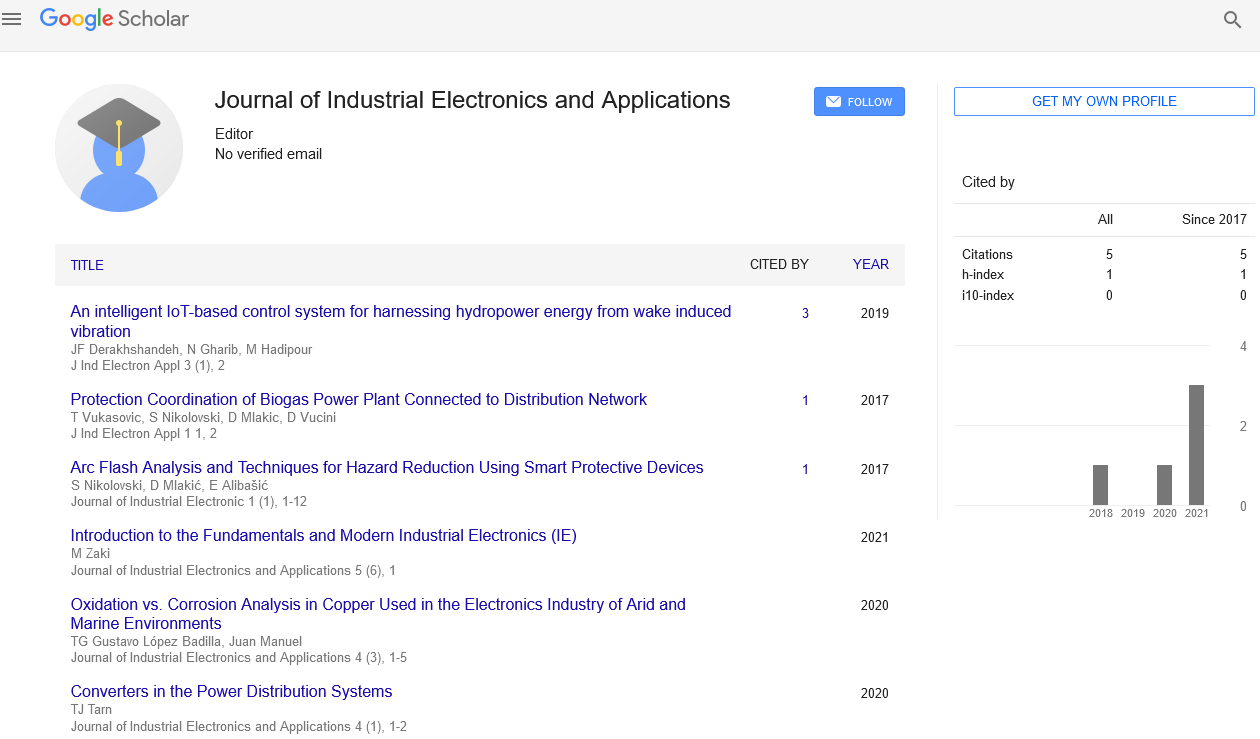Opinion Article, J Ind Electron Appl Vol: 7 Issue: 1
Integrating Industrial Informatics and Computational Intelligence for Smart Manufacturing
Yue Hou Maria*
1Department of Civil Engineering, Swansea University, Swansea SA2 8PP, UK
*Corresponding Author: Yue Hou Maria
Department of Civil Engineering,
Swansea University, Swansea SA2 8PP, UK
E-mail: yue.hoa@sefnsea.ac.uk
Received date: 24 February, 2023, Manuscript No. JIEA-23-95942;
Editor assigned date: 28 February, 2023, PreQC No. JIEA-23-95942(PQ);
Reviewed date: 13 March, 2023, QCNo JIEA-23-95942;
Revised date: 21 March, 2023, Manuscript No. JIEA-23-95942(R);
Published date: 30 March, 2023, DOI: 10.4172/JIEA.1000024.
Citation: Maria YH (2023) Integrating Industrial Informatics and Computational Intelligence for Smart Manufacturing. J Ind Electron Appl 7:1.
Description
The integration of industrial informatics and computational intelligence has emerged as a promising approach for optimizing manufacturing processes and enabling smart manufacturing. Industrial informatics involves the use of advanced technologies such as Internet of Things (IoT), big data analytics, and cloud computing to collect, analyze, and utilize data from various sources in the manufacturing environment. On the other hand, computational intelligence encompasses a set of techniques such as Artificial Intelligence (AI), Machine Learning (ML), and optimization algorithms to process and analyze data for decision-making and control. The convergence of these two fields offers new opportunities for transforming traditional manufacturing into intelligent, efficient, and adaptive systems. This manuscript presents an overview of the integration of industrial informatics and computational intelligence, their applications in smart manufacturing, and challenges and future directions in this field.
Manufacturing has undergone significant transformations with the advent of advanced technologies such as IoT, big data analytics, and cloud computing. These technologies enable the collection, analysis, and utilization of vast amounts of data from various sources such as machines, sensors, and devices, leading to the concept of industrial Internet of Things (IIoT) or smart manufacturing. IIoT allows for realtime monitoring, control, and optimization of manufacturing processes, leading to improved productivity, efficiency, and quality. However, the sheer volume and complexity of data generated by IIoT systems require sophisticated techniques for processing, analyzing, and extracting actionable insights. This is where computational intelligence techniques such as AI, ML, and optimization algorithms come into play.
Computational intelligence encompasses a diverse set of techniques that mimic human intelligence and decision-making capabilities.
These techniques are particularly useful for analyzing large-scale and complex data sets, identifying patterns, and making predictions or decisions in real-time. By integrating computational intelligence with industrial informatics, manufacturers can leverage the power of datadriven decision-making, automation, and optimization to transform their operations into smart and adaptive systems. This manuscript presents an overview of the integration of industrial informatics and computational intelligence, highlighting their applications in smart manufacturing and discussing challenges and future directions in this field.
Applications of industrial informatics and computational intelligence in smart manufacturing
The integration of industrial informatics and computational intelligence has been applied in various areas of smart manufacturing, including but not limited to:
Predictive maintenance: Predictive maintenance is an important aspect of smart manufacturing, as it allows manufacturers to proactively detect and address potential equipment failures before they cause production downtime. By collecting and analyzing data from sensors, machines, and other sources, computational intelligence techniques can be used to develop predictive models that can accurately forecast equipment failures and trigger maintenance actions at the optimal time, minimizing production losses and maximizing equipment uptime.
Process optimization: Industrial informatics and computational intelligence can be combined to optimize manufacturing processes by analyzing large-scale data sets to identify inefficiencies, bottlenecks, and optimization opportunities. By leveraging AI and ML algorithms, manufacturers can develop adaptive process control strategies that can continuously monitor and adjust process parameters in real-time, leading to improved product quality, reduced energy consumption, and increased production efficiency.
Quality control: Quality control is a essential aspect of manufacturing, as it directly impacts product quality and customer satisfaction. Industrial informatics and computational intelligence can be used to develop intelligent quality control systems that can automatically detect and classify defects in products, parts, or materials. These systems can leverage AI and ML algorithms to learn from historical data, identify patterns of defects, and continuously improve their accuracy and performance over time.
Supply chain optimization: The integration of industrial informatics and computational intelligence can also optimize the supply chain in smart manufacturing. By collecting and analyzing data from various sources such as suppliers, transportation, and inventory, manufacturers can use computational intelligence techniques to develop optimized supply chain models that can minimize.
 Spanish
Spanish  Chinese
Chinese  Russian
Russian  German
German  French
French  Japanese
Japanese  Portuguese
Portuguese  Hindi
Hindi 